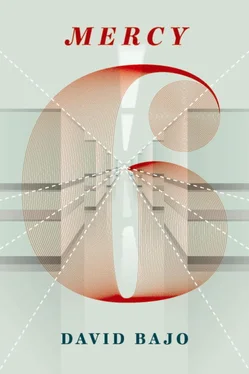Both could mirror sudden trauma. Both could strike a final blow suddenly, earlier symptoms hidden in the general malaise of grief, work, recovery. But when she let her vision rest on the ER bay, her self-doubt waned.
Two figures wearing the black and purple of ID entered the bay. Overdressed with surgeon’s cap and booties, the leader moved directly toward Mendenhall’s line of patients, the beds nearest the main station and elevators, the ones Pao Pao had arranged for her.
Even with his exaggerated getup, Mendenhall recognized Dmir.
She had never bothered to figure out his title, his position. She just knew him as a sort of containment executive, Thorpe’s link to the profane. Dmir liked to dress up as a doctor, did that whenever he had the slightest opportunity. The surgeon’s cap was new.
His trailing nurse appeared embarrassed by it, slouched and hanging back a half step. Mendenhall swooped into the bay. It felt that way; she didn’t sense her legs, any of herself—on wings.
As she moved to cut off Dmir, she tried to reengage with her body, her thoughts, distill and purge the metaphors. Dmir was metaphor. Mendenhall was real. She sensed Pao Pao sliding in to cover the flank, drew from this.
“Doctor,” she said to Dmir, stepping between him and his trailing nurse. As a child she had watched a show hosted by a purple dinosaur. She thought of that to gain some strength, some touch of earnestness. “Oh,” she said when Dmir turned to her, “it’s you. Just you.”
“Dr. Mendenhall,” he said, “we need this line of beds. We need this wall cleared.”
This did not surprise her. But something about him did. Dmir had a freshness about him. Maybe it was all the purple, the way he filled it. Pao Pao was tending one of her patients along the wall, just tucking the sheets, tapping the chart, saying something low.
But she was right on Dmir’s flank, drawing a glance from him and halting his trailing nurse. Mendenhall took one full breath.
“I have nine. Two ballistic traumas we’re stabilizing, three poisons we’re dissipating, two ODs—oxy and alcohol—and two nearing DTs.”
Dmir creased his brow, confusion disguised as concern.
“To answer the first question you should’ve asked,” said Mendenhall, just loudly enough for the patients and the nearby EMTs and nurses at the station, “I cleaned, sutured, and medicated the ballistics. They cannot be moved yet. Getting shot—even in the arm or leg—is highly traumatic. The wound is nothing compared to what happens to the whole nervous system—but you know that.”
She lowered her voice, offered Dmir an inclusive raise of her eyes.
“Moving the others would also compromise the stability of the first two. By attrition.”
Dmir straightened a bit, though still appearing stooped, in costume. Mendenhall remembered the music from the show with the purple dinosaur. The show had been good for her. She had been too serious as a girl, too concerned with real life.
“But it’s your call.”
“Attrition,” said Dmir.
“Yes. Attrition. The same thing that produced those three new containments.”
Pao Pao moved down one patient, creating some distance from Dmir but widening the flank in this battle.
“Look it up,” said Mendenhall. “You’ll like it. Hysteria is highly contagious. It flies.” She sensed Pao Pao’s warning glance. She backed off, drew a discreet breath. “I’ll clear the wall for you. As soon as we outpatient the ballistics.” She raised her voice. “You concur?”
Dmir looked at his watch.
“Two hours,” Mendenhall said before he could speak. “Tops. You can make the arrangements with Nurse Pao Pao.” They both turned toward Pao Pao, who was looking flatly at Dmir. “Or I can do that for you.”
Then she realized what exactly was new about him, the freshness.
He had come in—after containment. Dmir never stayed past five—not like real doctors. He had night air about him, cocktail hour.
His watch glittered. She could almost feel his pulse, measure its increase.
She remembered what she had hated about the purple dinosaur, the hate that made her want the show, need it. She would solve math problems during the episodes, lists of them, filling pages, all corners and margins, both sides, her fingers smeared with pencil lead. During songs she would draw the periodic table, delineate the inert gases, all subgroups. Babysitters stood horrified, their expressions not unlike those on the faces of the EMTs and nurses now watching her step once toward the station before cutting away from all of them, stepping to her patients.
Her patients. The longest anyone could be her patient was about two hours; then they were either discharged or assigned to the proper specialist. She had repeats—drunks, addicts, prostitutes, some ballistics. But ER repeats eventually disappeared. Into their lives, her mentor had told her, the lives they choose. See it that way.
Dmir lingered. Pao Pao was starting to leave, then halted between them. Mendenhall squinted at Dmir.
“What? What more?”
“Who’s Cortez?” he asked.
“Who wants to know?”
“We,” he said, “we want—”
“That was from my aunt. That was personal.”
Pao Pao spoke, her voice low, her look flat, but there was relish in the angle of her head, the motion of her fist toward the floor between Dmir’s shoes. “Cortez is her dog.”
Dmir looked to Mendenhall for verification.
“Cortez,” Pao Pao repeated. “A terrier, about the size of your Clarks. A little Scottie. Cortez. Cortez the Killer.”
“The Killer?” Dmir raised his brow, not sure which woman to address.
“From the song.”
“What song?”
“You don’t know anything, Dmir. You don’t know anything about anything,” Mendenhall said. “Tell Thorpe to stay off my personal messages.”
“You relayed information. Outside containment.”
“I told my aunt I was safe and sound. It was for her. You tell Thorpe it was a lie. I feel anything but safe and sound. With him up there. I lied to my aunt for the sake of his containment. Because if I had sent her the truth she would be coming for me.”
“Cortez, too,” said Pao Pao.
They left Dmir in unison.
Mendenhall visited the first ballistic, joining Pao Pao bedside the bed. Kae Ng. Twenty-three. His name and age read like something from the periodic table. She looked at his slender wrists and knew he was only fifteen.
He was looking at her in a flirty way. He was high on the stuff she had given him. His black hair fell over his eyes, and he smiled with one side of his mouth. He peeked once at his shoulder, at the dressing she had applied.
“Can I have the bullet?” He had a smooth, low voice.
“You do have it.”
He raised an eyebrow.
“I left it in. We usually leave them in. They’re sterile. We only take them out on TV.”
He seemed disappointed.
“I know,” she told him. “The only reason I joined ER was for the bullet. So I could be that doctor who pulled it out and plunked it into the pan. That sound, you know? That finality. That cure. But it doesn’t go that way. It never goes that way. It just melts inside you.”
“Someone could use a nap,” said Pao Pao.
In Pathology, Claiborne had the ventilation on full. Mendenhall could tell because the air was especially quiet. The vents did that, hushed the lab. Claiborne had once showed her the effect using a tuning fork he kept on his desk. He struck the fork—A, he told her. There was no sound. Then he fired the vents and struck the note again. The pure note emerged amid the gather of the ambient vents. So now maybe he had the vents on full for the music, which was a quiet violin solo drawing long single notes. But the lab was chilled, and the bodies remained on the steel, death grins forming.
Читать дальше












